#borut
Text
V slovo: Od Pahorja bo red za zasluge sprejela tudi družina Jožeta Pučnika
V slovo: Od Pahorja bo red za zasluge sprejela tudi družina Jožeta Pučnika
Ob koncu svojega desetletnega predsedniškega mandata bo Borut Pahor v ponedeljek posthumno vročil red za izredne zasluge Jožetu Pučniku. Pučnika je po smrti junija 2006 z redom za zasluge odlikoval že predsednik Janez Drnovšek. A družina pokojnega Pučnika odlikovanja doslej ni želela sprejeti. Odlikovanje bo prevzel Gorazd Pučnik, sin Jožeta Pučnika, so sporočili iz urada predsednika republike. Z…

View On WordPress
0 notes
Text
Predsjednik Slovenije u Beogradu : : BiH bi mogla do kraja iduće sedmice dobiti kandidatski status u EU
Predsjednik Slovenije u Beogradu : : BiH bi mogla do kraja iduće sedmice dobiti kandidatski status u EU
Predsjednik Slovenije Borut Pahor je izjavio danas da je došao u posjetu Beogradu prije sastanka Brdo-Brijuni, kako bi se posavjetovao sa srbijanskim predsjednikom Aleksandrom Vučićem o tome da u regionu ima dovoljno političke volje da se sačuva evropska perspektiva Zapadnog Balkana i stabilnost.
Vučić je izjavio da je “pitanje svih pitanja” veza između teške energetske situacije, predstojeće…

View On WordPress
0 notes
Text
Joker Out interview with magazine Mladina, published on 30th of June 2023
Interviewed by Vanja Pirc
Photos by Borut Kranjc
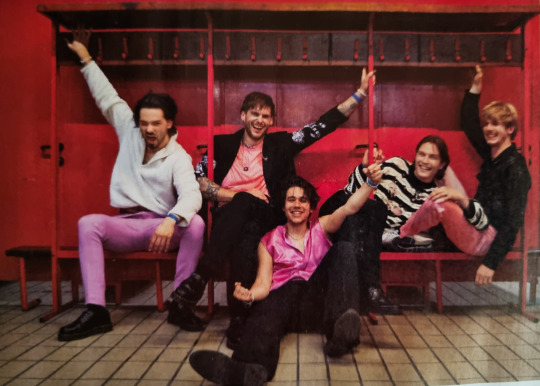
This year's Slovenian representatives at Eurovision, the five-member band Joker Out, attracted an unusually large amount of attention with their accessibility and playfulness, especially with the song "Carpe Diem." In the days and weeks that followed, it became clear that their Eurovision entry, which only placed 21st, had indeed opened the door for them to go abroad. They started adding new concerts in Ireland, Croatia, the UK, Scotland, Finland, Sweden, Norway, Serbia, and others to the ones they had already arranged in Slovenia and the former Yugoslav republics. They sold out all of them, some in just a few minutes. Well over eight thousand people will see them on the UK and Nordic tour alone. For musicians working in Slovene, that's an incredible statistic.
It's a remarkable milestone to see how they've come from "Špil liga," where they first came to the limelight by winning in 2013 when they were still a high school band, to today, being greeted by masses of enthusiastic fans below the stage, and being selected by the Scottish band Franz Ferdinand to be their opening act at Croatia's Špancirfest festival. We spoke to lead singer Bojan Cvjetićanin, guitarists Kris Guštin and Jan Peteh, and bassist Nace Jordan. Unfortunately, drummer Jure Maček was missing, but we could see that he is a man of many talents by looking at the huge wooden structure with a platform that added another floor to the band's rehearsal space in Šiška, Ljubljana.
After Eurovision, you made no secret of your disappointment at finishing 21st, but your Eurovision song "Carpe Diem," sung in Slovenian, is now one of the most listened-to songs of this year's Eurovision event. It's being played all over Europe, most notably in Finland, Poland, the UK, the Netherlands, Spain... Did you expect this turn of events?
Bojan: The result we achieved at the Eurovision Song Contest was really not the greatest. Not even close. But, as you can see, in the end, it doesn't even matter. What is more important for us is that we managed to achieve the rest of the goals we had set for ourselves. We approached Eurovision in a very organic way, aiming to translate our stage and concert experience from real life to the Eurovision stage. It was clear to us that this is the biggest show stage in Europe, maybe even in the world. We were aware that this is a competition of one song, one comprehensive performance to be presented in three minutes. Our goal was to ensure that the audience would remember Slovenia's performance in 2023, and we have achieved that. We also aimed to connect with other performers, and we succeeded in doing so. But most importantly, we wanted both our Eurovision song and our other songs to be well-received in the real world. The data from radio stations, online streaming platforms, and concert offers confirm that apparently, we have achieved that as well.
Before, you were known mainly in Slovenia, and to a lesser extent in the Balkans. However, your Eurovision song has temporarily climbed to the top 50 most viral songs in the world chart on the streaming platform Spotify. You even briefly surpassed Sweden's Loreen, the winner of this year's Eurovision, in terms of popularity.
Bojan: Just to clarify, we only surpassed her for a day or two. But it's really nice that it happened on Spotify's list of the most listened-to songs in the world.
Kris: Well, she did get a billboard in New York's Times Square as the winner at the time, so it's a matter of who surpassed whom, I suppose (gesturing with his hands).
Well, who did?
Bojan: I believe that what we will gain from this performance will surpass what many other performers will achieve. Eurovision has introduced us to a very large audience in a very short time, and they have really connected with our music. They are now translating our lyrics into their own languages and even learning Slovenian. We were surprised to see how many of them bought dictionaries to learn Slovenian - we know this because we were asked to sign them. Others are learning Slovenian through online platforms, and there are even dictionaries being created on TikTok. These listeners are not bothered at all that we are not creating in English at this point; on the contrary, they would like us to keep it that way. However, we have to be realistic. To truly expand our listener base, it's important to be accessible to people.
That's why you have already prepared an album a few months ago, featuring songs from both your previous albums rearranged in English. The album is now awaiting release. One of your main goals was to be able to translate your concert experience onto the stage.
Bojan: The first real international test after Eurovision was in Zagreb, where we performed as the opening act for the most popular young Serbian band at the moment, "Buč Kesidi", at a previously arranged concert. We performed outdoors in the middle of the day, with the sun still high up in the sky. However, we were greeted by a crowd of 2,500 people and received a phenomenal response. They sang along with us, and later we read in the Serbian media that we probably have the most Croatian fans among Slovenian bands. After this show, when we announced a solo concert in Zagreb's Tvornica for November, which is comparable in size to Ljubljana's Cvetličarna, the tickets sold out in five hours. So, we arranged another concert in the same venue, and that one sold out as well. The response in Croatia has been truly amazing, and they have set a very high bar for the future.
You have been intentionally engaging with the countries of the former Yugoslavia lately. Through songs like "Demoni" ("Demons"), you have approached them language-wise. In addition to Croatia, you have also been booked for concerts in Serbia and Bosnia and Herzegovina. Your Eurovision song also reminds me a little of Plavi orkestar, which was once the most popular Yugoslav pop band, or Đorđe Balašević. It is probably not a coincidence that the line "The game of hatred is your thing, thank you, don't count on us" is reminiscent of his hit "Računajte na nas" ("Count on us")?
Bojan: No, no, it's not a coincidence.
Is it nevertheless more difficult to plan a breakthrough to the rest of Europe? After Eurovision, the Irish were the first to sign you up, did the audience there also know your songs by heart?
Bojan: Yeah, we haven't really gotten used to that yet (laughs). In Ireland, we managed to sell out our first show in 12 minutes. It's true that it was a small venue, comparable to Ljubljana's Orto bar, and it wasn't a solo concert, but a joint performance with this year's Irish Eurovision representatives. However, due to the high level of interest, we arranged another concert in a club twice as big, which is also their most iconic venue. Soon after, other venues started to show interest. We announced a UK tour, with over five thousand tickets on sale for four shows in major cities, and they sold out. We announced a Nordic tour, with around 2,500 tickets available, and it sold out in half an hour, along with three Finnish concerts in just ten minutes. Later, we released an additional 770 tickets, which were gone in five minutes. Offers are also coming in from many other countries, and it is impossible to predict what will happen in the upcoming months.
A number of Slovenian music artists have successfully reached international audiences, from Senidah to Laibach, from Gramatik to Umek, and you were the first ones to consider using Eurovision as a springboard. Would it make sense for our country to continue using this event to promote established musicians who are eager to make an international breakthrough? You were internally selected for this competition.
Kris: It all depends on what we as a country want to achieve from this competition in the future. We have to decide whether EMA is a competition where we find the most suitable representative and expect them to make the most of their opportunity while promoting our country along the way, or whether it is a competition where Slovenian musicians present themselves to Slovenian audiences. Personally, I believe that it is definitely better to choose a performer who already has an established infrastructure in place and a certain support base, because this can enable him to use his potential to the fullest.
Jan: I think that would be the best approach as well. However, since many musicians see EMA as one of the few opportunities to showcase their work to a wide audience through public broadcasting, it would make sense to maintain that aspect too, perhaps as a prelude to EMA, transforming it into a grand finale for carefully selected artists, similar to Sanremo.
Bojan: The main issue with the previous selections was that Slovenia didn't approach it with the intention of winning. Of course, success in such a significant event is not guaranteed. But why not approach it strategically nonetheless? For example, I believe we should send Senidah to Eurovision in 2024!
Senidah is the biggest star in the Balkans, the most listened-to musician. Is she also your role model in that sense?
Bojan: Absolutely. Senidah is the first Slovenian artist, after Mr. Predin and "Lačni Franz", to truly break through in the Balkans. She does write music in Serbian, but that's irrelevant; what's important is that she's made a remarkable breakthrough in a market that has so far been very closed off to Slovenians. And not only has she broken through, but she is topping the charts. However, I would understand if Senidah refused to participate in EMA, at least as long as the current rules are in place. EMA is too close in time to Eurovision. The winner has only one month to submit material. Imagine having to put together the most important performance of your life in just 15 days? We, on the other hand, had more time since we were internally selected—three months—and we utilized this extra time to design our pre-Eurovision campaign, which ultimately played a key role in our success. That's what left the biggest impression.

You managed to invest between ten and fifteen thousand euros of your own funds in this promotion. You have an extensive domestic touring career behind you. In October, you will fill our biggest venue, Stožice, for the first time, where you expect 12,000 people.
Kris: I've always considered it a privilege to have established a music career at such an early stage in our lives and to have quickly reached the point of financial self-sufficiency.
Bojan: It really worked out for us that right after we finished university, we began our professional lives as musicians.
Those who know you say that you are very disciplined, very organized. Bojan, your fellow classmates from Poljane Gymnasium in Ljubljana also say that even back then, you were absolutely convinced that you were going to make a breakthrough. Many people rolled their eyes at the thought, but you had a clear objective. You were networking with the right people, educating yourself, and Pavle Kavec taught you guitar...
Bojan: Yes, Pavle the legend. I knew during my time at Poljane Gymnasium that I wanted to be an artist. I hadn't fully decided whether it would be music or something else because I was also considering studying acting. But my thoughts were always centered around creating. I suppose that's more or less true for all of us. When Jure and Nace joined us, the first question was whether we were fully committed at 1000%, or if there was another one percent pulling us towards a "plan B," such as the directions we were trained in. No, there is no "Plan B" anymore. At some point, we made the decision to cut it off.
So, the high school students at Poljane Gymnasium may very well forget that you were once planning to be their sociology professor? We've also seen you in a few episodes of the series "Gospod profesor" ("Mr. Professor").
Bojan: I've given up on the professorship, but I still find acting very interesting. For once in my life, I would like to be in a film, playing a totally negative character. I would be mean as a snake. And it doesn't even have to be a Slovenian film; it can be from the Balkans.
Kris: I have to admit that I never thought of making a living from music, although I certainly saw it as an ideal. Even when I was deciding on my studies, I wavered between sociology and chemistry, and then preferred the latter because of its greater potential for employability. Well, later on, I did go into social sciences, for a master's degree in international relations.
Yet Kris, you were the one who had the ideal conditions to become a musician. You grew up playing guitar, because your father, Miha Guštin - Gušti, is the co-founder of "Big Foot Mama", one of the most popular Slovenian bands. Today, you are considered to be their successors.
Kris: I really had the ideal conditions to become a musician who does this for a living. Not only because of my dad, but my mum also worked for record labels for many years and has recently embarked on this path again, so I've been in touch with both sides of the music world, creatively and business-wise, since I was a little kid. But I didn't really start playing guitar until I was 14, 15. And nobody else among us is a trained musician either, except our drummer, Jure Maček.
Bojan: Yes, our Maček finished elementary music school, and he also played a lot, mostly with the "Logatec brass band".
Jan: Let's not forget his performances with the "Golaž brass band", and with the Cantabile Symphony Orchestra...
Jan, you are a mathematician. The link between music and mathematics was explored by Pythagoras after he listened to a blacksmith striking a hammer, and from that he developed the study of harmony.
Jan: Yeah, at the moment it's kind of like, if you have an out-of-tune guitar, you can just say you have a Pythagorean tuning (everyone bursts out laughing). To me, maths is relevant because it's the only thing in the existence of human understanding that you can really count on. It can be used to get definitive answers to at least some questions. I see it as something that gives you structure in your life.
Nace: I would have chosen to study veterinary medicine if I had gone to university, but I discovered very quickly that music was my passion. After high school I went out into the world, I played in a band on a cruise ship that more or less sailed the Baltic, somewhere between Russia, Finland and Sweden. You could say I've got a lot of musical mileage from playing abroad. But it's limited to German schlager and German rock. Our audiences were mostly German families (laughs).
You also have the most experience of performing in front of TV cameras, especially as a member of the in-house band of the TV show "V petek zvečer" ("Friday Night"), which gives airtime to more folk-music genres on TV Slovenia. Have you scrapped this "plan B" now as well?
Nace: Officially, I'm still a member of that band; maybe the managers are expecting me to come back to the show in the autumn. But it remains to be seen whether that will be possible. Most probably not.
Today, together with MRFY, you are considered the successors of our most popular rock or pop-rock guitar bands who managed to appeal to the masses, not only of "Big Foot Mama", but also, for example, "Siddharta" and "Dan D". Why hasn't there been a real breakthrough of new bands of this kind in the last few years? Were guitars considered to be outdated, were young people closer to electronica, trap, hip-hop, mixtures of genres?
Bojan: The music of "Siddharta" and "Big Foot Mama" was a kind of basic building block for me from the very beginning. These people have influenced me more than any other world-renowned musicians. So having them support us really means a lot to me. And the Špil Liga, where student bands have been entering for the last decade, has definitely been a very strong factor in the revival of the scene. MRFY are also from Novo mesto, which is considered a mini Slovenian capital of rock'n'roll, as many of the bands that have developed under the patronage of Tokac, the music producer and frontman of "Dan D", originate from there. At the same time, in last few years the Slovenian youth has become hungry for home-produced music of all genres, and this has stirred up a strong wave of creativity, which is being held in the hands of our own generation, as well as those a little younger and older than us. At this point, the whole spectrum of what we need, from clothes to design to photography, is being created by people our age, as well as those a little younger and older than us. Well, with one exception, of course, being our producer Žare Pak, but he's young at heart.
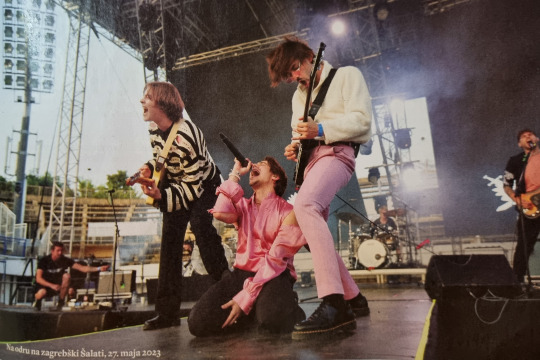
As you reach out to a wider audience, do you also feel the pressure to meet the ever-increasing expectations of both listeners and the music industry?
Jan: I feel that right now, more than ever, we can be confident and sure of what we are doing. We didn't even enter Eurovision with some deliberately made hit-like song to suit Eurovision ears, but we did a Joker Out song that could easily have been on our album last year. Our achievements so far prove that we are doing something right because people at home and abroad like it.
Kris: I also feel like we have more freedom to create now but also fewer inhibitions to go into more experimental waters in terms of music, outfits, visuals, or anything else.
Do you think that's what some people expect from you now?
Bojan: Musicians are often criticized for their style, genre, or sound. But such criticisms are absurd.
In particular, Slovenian rock or pop-rock has always been attacked in this respect for relying too often on tried-and-tested forms and less often, for example, on boldness, innovation.
Bojan: We've been on the scene long enough, and we know that the very concept of what Jokers do bothers some people. And that's why they keep pushing their idea that we don't make authentic music but rather some crap that we invented just to exist. So, they feel it would be good if we would stop doing that. These people want, or even demand, that Joker Out should stop being Joker Out. And we're happy that on the first and second album we were able to make music completely unburdened by expectations of how people would react to it. I think the second album is quite challenging in both its sonic elements and the overall meaning of the lyrics in certain songs. I'm sorry that not one of the critics mentioned "Plastika" ("Plastics") in their reviews. None of these intellectuals who have so much to say against our love songs thought that this could be a harbinger of a different, new direction.
This song was written in response to a study showing that the vast majority of teenage girls today want plastic surgery and other body modifications to meet their perverse beauty ideals.
Bojan: There's a lot of content that people don't want to see. On the other hand, I also don't understand why songs about love, which are in the vast majority in this culture at the moment, should be inferior to those about society. In fact, I hope to be able to sing about love for the rest of my life.
Kris: You will, you will sing "Umazane misli" ("Dirty Thoughts") for the rest of your life (laughs).
You addressed Europe with the words "We'll be dancing all night long, we'll love and play with each other as if there was no tomorrow." You have stated several times that you are not a political band, but isn't that actually very political? What is more political than being able to smile and rejoice even in the worst of situations?
Bojan: I very much agree. I even think that if Tokac had sung our song, the message would have gotten through to a lot more people. But because we sang it, a lot of people didn't take it seriously.
The current Prime Minister, Robert Golob, after learning that the future coalition had brought down the government of Janez Janša, said, "Today people are dancing, I am waiting for you to start dancing too." Do you think that if we had had your song then, he would have said instead, "We'll be dancing all night long"? As some employees of RTV Slovenia did when the depoliticisation of their institution could begin?
Bojan: The song "Carpe Diem" is largely written with the idea of fighting back against the things that are happening today. The fact that we had Eurovision in a country that was not last year's winner, because the event could not be held there due to the war, is quite an indication of the troubled times we live in. On the other hand, our only defense as musicians is to spread positive energy among the people and send socially relevant messages. We cannot do more than that. We do not want to take up arms, and we won't. Our only weapons can be our songs.
Culture and art can certainly be weapons too, especially in situations where people are suffering. Do you think that's why Ukrainians supported you at Eurovision, both the audience and the jury? The country is in ruins because of the war, people are displaced, and there is no end in sight to the conflict. But your dancing until dawn has been noticed.
Bojan: I am a child of refugees from Bosnia and Herzegovina. My parents had to leave their home in Banja Luka because of the war. They came to Slovenia as refugees and stayed here. They had to rebuild their lives. In light of today's events, I can only conclude that the saying 'Historia magistra vitae est' (“History is the teacher of life”) is clearly not true. Because one day, when all the problems of this world are solved, I too will be able to afford the attitude of being opposed to all that is positive. But at the moment, that is not a possibility.
Your parents, Bojan, had to move because of the war, and your mother, Kris, moved from the Netherlands to Slovenia for love.
Bojan: That's a much nicer reason, isn't it?
Kris: Well, I also have a grandfather who fled Indonesia because of the civil war.
Migration flows have been huge in recent years, with thousands of people pouring into Europe, but they are often met with contempt and harsh treatment. Do you feel that your intimate experience of all this migration has also shaped your attitude towards all those who are seeking a better life?
Kris: Absolutely. In my home, this has always been a topic we have talked about. When I was still living with my parents, we often watched the TV program "Dnevnik" together, and whenever they showed a piece on migration, my mother would get very emotionally involved in the scenes on the screen. And that sticks with you. When you see a parent who can understand someone who had to leave home for completely different reasons and on the other side of the world, it naturally rubs off on you.
Bojan: Most of all, you feel the spectrum of pain associated with having to leave your home is much more than just having to leave a place. Only then do you realize that home is really a tangle of space, of people, of smells, of tastes, of everything surrounding you. Leaving all that behind is not the easiest thing to do. It is even harder to leave under duress, and the hardest to leave knowing that your home is in the process of being destroyed and that when and if you return one day, it will not feel like home anymore. The same people will not be there, the same smells will not be there. What has shaped your life will no longer exist.

Alongside wars and conflicts, another key reason why people from other parts of the world are moving to Europe in large numbers is climate change. Your generation is leading the fight to reduce carbon dioxide emissions, to live more sustainably. How important is this cause to you?
Kris: The fight for climate fairness is one of our few very clear common political positions. Here we are completely united and support all political choices towards sustainability. It is also very clear that this is an important issue not only for us but also for a large part of our audience. It was interesting to note that two years ago, at a rally for climate justice in Ljubljana, we saw a poster with the lyrics of one of our songs. We've summed up our own thoughts on the subject in the song "Novi val" ("New Wave)," which was written last year and is currently one of our most successful and important songs.
In that song, you say "The radio only plays lightnings and strikes', the newspaper says that we' ve lost our way. Today we'll sing and raise our glasses, we were born yesterday and have already been blamed for everything." And what are you guilty of? Probably not the fact that your generation faces precarious employment, that loans are hard to come by, and so are real estate, even rental properties?
Bojan: These are the facts of life lived by the "born yesterday" generation. They are the result of the accumulation of bad decisions over decades. These facts manifest themselves in reality as obstacles that reduce our ability to build the pillars of our independence and, as a consequence, are the reason for our failure to live up to societal expectations. In a world where laws have been written for decades in favor of a mega-massive littering of the planet, we are guilty of standing up for environmental justice instead of "doing something smarter and more serious with our lives," even though previous generations have themselves turned the (labour) market into a war zone of precarious employment. We fight day in and day out with the uncertainty of whether or not we will be employed tomorrow...
But even in this song, you sing and you raise your glasses.
Kris: This song and the Eurovision song "Carpe Diem" are actually very similar in spirit and message, except the second one addresses the listener in a dance guise and this one in a much more serious manner.
The song "Novi val" ("New Wave") has received a lot of attention because of the English version you released before the Eurovision, which you performed with the renowned British musician Elvis Costello. Your now ex-member Martin has a godfather who is a friend of Costello's, and in 2013 you sent him the song "Gola" ("Naked") to listen to. He did listen to it and suggested that you send him more songs. So last year you sent him "Novi val" ("New Wave").
Bojan: Yes, that was true, and when I sent him that song, I also asked him if he would be willing to re-arrange it in English. And he wrote back that he was up for it. Shortly after that, only about a week later, he sent me another email saying if we all agreed, he was ready to sing the song with us. Interestingly enough, he felt the song even before he understood what it was about. His first reaction after hearing the Slovenian version was that it was "a charming song that transcends the understanding of language". He recorded his vocals in New York, and we recorded them in Ljubljana. At the end of the song, we kept the chorus in Slovenian, at his request.
Costello has two Grammys, two Brit Awards, and was named one of the 100 greatest rock'n'roll musicians of all time by Rolling Stone magazine. What does his support mean to you?
Bojan: I can say without any reservation that even if I never wrote another song after this, I would forever be proud of what I have achieved. But it was this collaboration that gave us an indescribable amount of new energy to create. I am very proud of it. However, I must add that I felt the same pride when Tomi Meglič or Grega Skočir gave us words of encouragement. The moment when I first felt their sincere appreciation was a turning point for me, and since then I have existed quite differently as a musician. But of course, it is clear that Elvis Costello's encouraging words carry international weight. And that is something completely new for us. It's just a pity that we haven't been able to meet up yet because he was on tour in the US at the time of the recording of the song and later the video.
He will be touring Europe in the autumn, including Hamburg. You recorded the Eurovision song there in December.
Bojan: He honored us greatly then. He sent us the song "Hamburg Postcard", which he wrote especially for us.
Kris: Let's not forget something else. Our band has always described our music as "shagadelic rock'n'roll" (the Oxford English Dictionary defines shagadelic as "sexy, but in a psychedelic or retro way", A/N). We borrowed this term from "Austin Powers", but it was actually spoken by Elvis Costello, who played himself in that film. When we sent him our song "Gola" ("Naked") in 2019, we thought it would be a good idea to let him know that we also use the term "shagadelic rock'n'roll". And then he personally gave his permission to use it because he felt that that was what it was. To complete the circle, Elvis Costello is one of the original protagonists of the English New Wave, and we are now singing together about the New Wave. He is also from Liverpool, which hosted this year's Eurovision. Our collaboration was clearly written in the stars.
Costello, as a Liverpudlian, knew the most famous local musicians, The Beatles, very well and had worked with Paul McCartney. The Beatles are also among your role models, and this year you also visited the place where the Beatles began their musical journey for the first time. Do you now understand better why they remain the greatest?
Kris: For me, visiting Liverpool and the places that influenced the Beatles and their music gave me some perspective. We knew them through songs, like Penny Lane, for example, but in reality, it's much smaller and more 'plain' than we imagined. Liverpool is a beautiful city, but the suburbs where the Beatles lived are very ordinary working-class housing estates. One could say quite bland. Now I walk around Ljubljana with different eyes. I can imagine that one of our future songs could also feature an insignificant, less exposed street that made its mark on us...
Bojan: And this is where you can see very clearly why the Beatles are the Beatles. Because everybody has a Penny Lane in their life, an ordinary street where you meet a friend. Penny Lane is the most universal thing in the world
The English song "Novi val" ("New Wave") was covered by the BBC and ITV, and the British voted for you at Eurovision. Your music and performances have always been influenced by British pop. Is that one of the key places for you, besides the Balkans?
Bojan: I think our focus is on any place that is willing to accept us, but England has a special charm because we ourselves have been heavily influenced by British music. I'm not the ultimate "nomad," I dislike long flights and exotic destinations that can be unpredictable, so Europe is very dear to my heart. I would be very happy if we could establish ourselves as a European band that could travel a little bit around Scandinavia in the summer and then Dalmatia in the winter...
Kris: Or Spain, where we would eat tapas.
Is the interest in your band in the country also related to the fact that Bojan speaks Spanish?
Bojan: Yes, I ended up doing more interviews in Spanish than in English. The Spanish have also been very active because of our links with their Eurovision representative Blanca Paloma.
Kris: It's really amazing how you can charm a foreign audience by speaking their language. I understand it with the Spanish, as they are mostly less proficient in English, but I was surprised by the Dutch. Dutch is my mother tongue, of course, but I didn't expect that it would matter because in the last few years I have noticed that in Amsterdam, almost only English is spoken on the street. Even the oldest market vendor speaks perfect English. But they were very enthusiastic. On streaming platforms, the Netherlands is one of our top 10 countries.
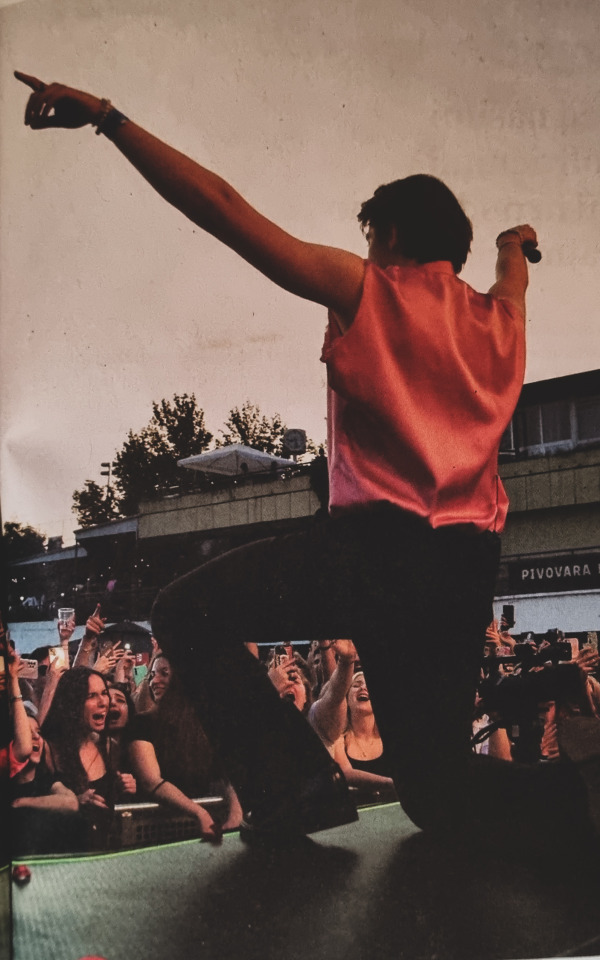
You mentioned earlier that your fans are now learning Slovenian. What about your future - will it be written in English?
Bojan: The next album will almost certainly have songs in English, Slovenian, and Serbian, but it's very possible that there will also be some in French or Spanish.
What about Finnish? At Eurovision, the most talked-about thing was your friendship with the Finnish representative Käärijä, who came in second place. When you, Bojan, sang his song, he praised you, saying it was "better than the original".
Bojan: We haven't talked about a musical collaboration yet, but I was a guest at his concert in Helsinki in June, and we would be very happy to have him at our concerts. Unfortunately, that won't happen in Stožice because he has a big concert on the same day.
Now that it is clear that your international ambitions are growing exponentially, what is the ultimate goal where you would say, well, now we have made it?
Kris: Even before we had international ambitions on the level we have today, we often talked about how performing on the main stage of the Hungarian festival "Sziget" would be a testament to the fact that we have achieved something in our lives. Do you remember?
Bojan: How European of us, right? (laughs)
And - have they called you yet?
Jan: Not yet, but we are already learning Hungarian just in case (laughs).
Kris: And we were just wondering why we shouldn't just announce a concert at Wembley Stadium in London in 2030.
Bojan: Yeah, because if we started selling tickets now, we might even be able to sell them by then. (Everyone bursts out laughing because the stadium seats 90,000).
273 notes
·
View notes
Note
Hello there. I hope you’re having a good time.
I have a little question if you can help me with it. I was looking for official info but can’t find how tall is Kankuro in blank period/Part III. I know he’s one of the tallest, but how much? It’s driving me nuts.
Thank you (:
So this took me a little while to figure out but I got it!
The post-shippuden databooks (The Last databook and Boruto movie databook) don't contain any height data, which confused me for a while because a lot of characters have their height for one or both of these eras stated on their wiki page.
But I've finally figured it out this morning!
Those heights comes from settei, the reference sheets animators use and that are sometimes made public.
This website has a settei collection for the Bortuo movie and Naruto The Last movie: http://setteidreams.net/settei/
We have one with Borut Era Gaara and Kankurou on it:

As adults, Gaara is 172,5cm, and Kankurou is 180cm! There's also one with Temari where she seems to be about 168cm (this feels so wrong lmao).
As far as being amongst the taller or not, Sand Sib + Konoha 13, here is the line-up:
Hinata: 163
Sakura, Ino: 165
Tenten: 166
Temari: 168
Gaara: 172,5
Kiba: 173
Sai, Shikamaru: 176
Lee: 177
Chouji: 178
Naruto, Kankurou: 180
Sasuke: 182
Shino: 186,5
Fairly in the tallest although Shino keeps flying over the competition, of course haha.
Bonus: while looking for them I found this one of the three sand siblings in the flashback at the time they play together, Gaara must be about 5:

I did a few measurements and it would make something like
Gaara, 5yo: 113cm
Kankurou, 7yo: 135cm
Temari, 8yo: 131cm
Hope this helps!
8 notes
·
View notes
Text
With the recent strengthening of the capitalist crisis that triggered a general move towards extreme right-wing populism across Europe in the wake of the ‘refugee crisis’, the narrative of open rehabilitation of fascism and local collaborationism is yet again on the rise across the entire territory of former Yugoslavia. The direct rehabilitation of local fascism assumes various forms: from the popularisation of fascist songs and celebrating the Hague war criminals as heroes – regardless of whether they have been released, convicted or have died – to the erection of monuments to war criminals from the recent wars and fascist collaborators from World War II, and setting up paramilitary groups that will defend the homeland against migrants and the left. This is undoubtedly a grim landscape for the post-Yugoslav culture and the politics of memory, which does not trigger any political enthusiasm, hope, or inspiration for the immediate future. This is why it is so important to resurrect the militant figures of the past and mobilise the revolutionary resources, while at the same time remaining aware of the trap of simple nostalgic commodification. Critical theory, emancipatory politics, and art need to become more combative in their claim to repeat the partisan rupture. This does not mean that we should blindly repeat what is clearly not here anymore, that is we cannot simply walk through the forests and imagine that we are partisans and that this is Yugoslavia and its heroic past. On the contrary, affirming the Yugoslavian revolution means repeating the partisan and communist gesture, i.e. continuing with the communist politics that strived for a new encounter of emancipatory thought and political practice in new circumstances. One needs to rethink Yugoslavian socialism and understand that its contradictory developments implied a form of thinking about Yugoslavia from its interiority that was linked to the affirmation of the partisan ruptures, as well as to the uncompromising criticism of the revolutionary and post-revolutionary socialist transition.
Gal Kirn, Partisan Ruptures: Self-Management, Market Reform, and the Spectre of Socialist Yugoslavia, trans. Borut Praper & Gal Kirn
21 notes
·
View notes
Text
I read an interesting article about antisemitism in the Weimar Germany period (democratic Germany before Hitler came to power) that describes conditions that function as a case study on why anti-discriminatory laws are required and how we can't trust free market capitalism to result in social progressivism. The article is Antisemitism in Tourist Facilities in Weimar Germany by Jacob Borut, and it is available to read for free at Yad Vashem's website. It describes how German tourist facilities, marketing to profitable demographics with no anti-discrimination laws to keep them in check, ended up discriminating against demographics that upset the primary customer base. Sometimes, this has a progressive result, like marketing to Jews by discriminating against Nazis, but it ultimately reflects the cultural prejudices, and they wound up marketing to antisemitic Christians by discriminating against Jews--and always discriminated against disabled people as a reflection of cultural ableism.
5 notes
·
View notes
Text

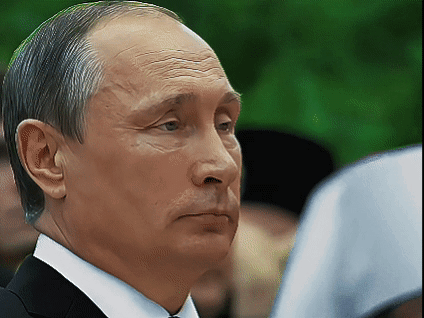
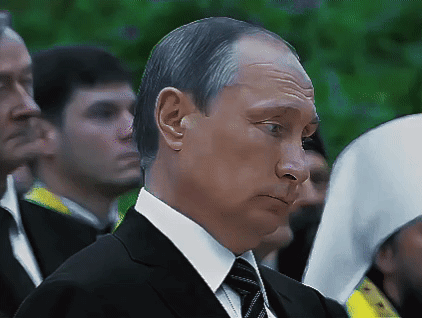


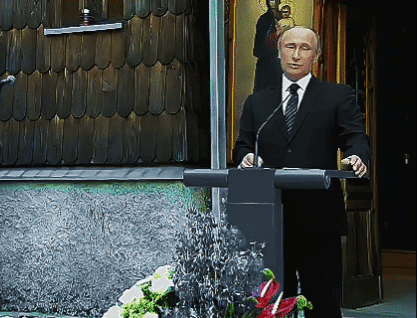
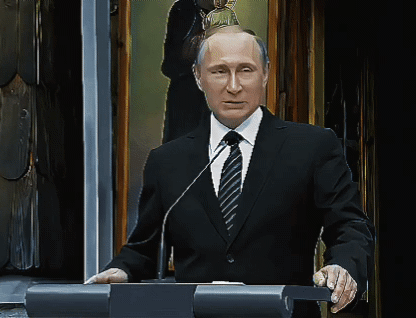
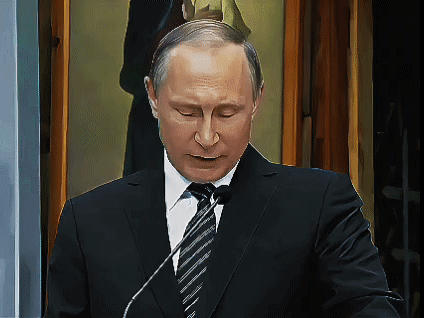
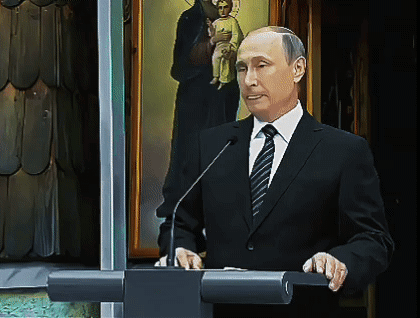
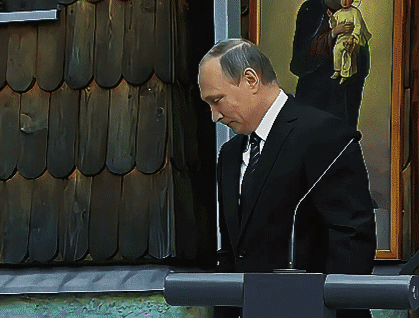
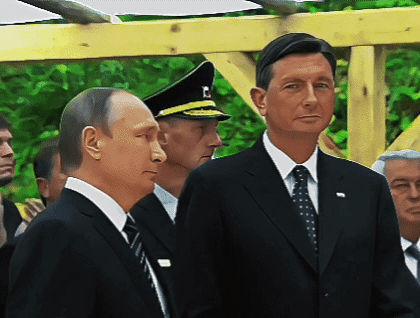
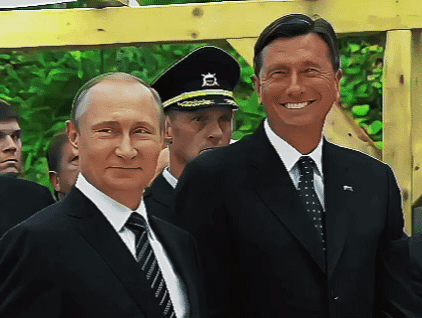
Vladimir Putin and President of Slovenia Borut Pahor took part in a memorial ceremony marking the 100th anniversary of a Russian chapel built near the Vršič Pass in memory of Russian soldiers who died there during the First World War. July 30, 2016
#putinedit#vladimir vladimirovich putin#vladdy daddy#russian president#Президент России Владимир Путин#my edits
3 notes
·
View notes
Text

@erikag59
Oh yes, people are indeed generally quite surprised when they hear about a party forming 3 months before the elections and then winning.
But for us in Slovenia this "experimental" approach comes as no surprise, because that has already happened before ... twice
To bring out a graph I've already posted here before:

These are the results of the parliamentary elections since 1992, with the paries approximately ideologically arranged: the aquamarine of DeSUS serves as an approximate centrist dividing line between the left-leaning parties below it (DL is a notable centrist exception, but I liked its downward curve there lol) and right-leaning parties above it)
There's quite a mess in the bottom part of this graph. That is the left-leaning voting block, which has chosen to rally behind a different party in every consecutive election after 2008 – following the collapse of LDS, the OG centre-left party that ruled from 1992 to 2004 (with a short, half-year intermission in 2000), back in 2006~2007 – being dissapointed with the results each time:
PS, which won the most votes in 2011, was established a bit more than 2 months before the elections by Zoran Janković, the mayor of the capital Ljubljana (2006–2011, 2012– ). What followed was one of the weirdest sequences of events in Slovenian political history* (though definitely not the weirdest one).
SMC, which won the most votes in 2014, was established a bit more than 1 month before the elections by Miro Cerar, a highly respected legal scholar.
LMŠ, which didn't win even close to the most votes in 2018 (but ended up leading the government), was the party of the mayor of Kamnik, Marjan Šarec, who had worked as a political satirist before going into politics himself (most prominently, he was a famous imitator of Slovenian politicians – well, mostly:

). His national-level political project started a bit earlier as a surprisingly effective challenge to the incumbent Borut Pahor at the 2017 presidential elections (though the latter did end up winning), carrying that political potential into the 2018 parliamentary elections.
GS, which won the most votes in 2022, was, as mentioned, established 3 months before the elections by Robert Golob after Janša made him (practically out of nowhere) into his direct opponent (the the post in the link above).
So, the continual emergence of left-leaning parties at every election is not a surprise anymore at this point, it's a pattern. Which can be frustrating, but it does also mean that when people (especially in the foreign press) see the consistently high results of Janša's SDS and think that that means that party is going to win the next election, that's deceiving. Despite SDS's consistent results, we've only had right-wing governments for about 8 of the 33 years of independent Slovenia (1991–92, 2000, 2004–8, 2012–13, 2020–22).
*In 2011 Janković failed to form a coalition and we had to endure 1 year of Janša, before his govt collapsed and PS did eventually take over, with its then-president Alenka Braušek becoming PM – the Janša govt collapsed because of the opening of a corruption investigation regarding both Janša and Janković; Bratušek took over PS while the charges against Janković were being investigated. In a turn of events that are hard to conceive of, a year later, when the corruption commission didn't find anything, Janković challenged Bratušek for the presidency of the party, while she was the sitting prime minister of the country. She lost the party election, splintering the party in two, with a significant part of the PS membership (including Robert Golob, interestingly enough) following her in forming her own party (ZaAB, later SAB). In the process, she resigned as PM, triggering snap-elections. PS, which received 28.51% of the vote in 2011, failed to reach the 4% threshold in 2014 (literally decimating its support down to 2.97%), falling into obscurity, while ZaAB did get into parliament (barely, with 4.38%).
Bratušek was again successful with getting into parliament in 2018, before being swallowed up by Golob's GS in 2022 (quite literally: after its electoral failure, SAB – together with LMŠ – officially merged with GS in June 2022). She is currently the Minister of Infrastructure. Janković is still the mayor of Ljubljana.
#j#slovenia#slovenian politics#introducing the tag bc i have enough posts about it at this point that i should separate is from the general 'slovenia' tag lol
5 notes
·
View notes
Note
Hi! I think chapter 485 makes it even more clear that he was talking about restoring his clan's honour so your interpretation is spot on. He would not have 1 kid that he left for over a decade with a wife he never even kissed if he wanted to repopulate the clan 🙈
Ah, yes, chapter 485, during Sasuke's (understandably) batshit insanity arc.
Here are the panels, but I'm only going to focus on the highlights, because Sasuke speaks a LOT here (more than anywhere else in any of the 72 volumes, I think).




Okay, so first off:

Romaji: Kegasareta Uchiha ga joukasarete iku kankaku
My Translation: The Uchiha (name) which had been dishonored (because of Konoha) is, I feel, becoming purified (because of what was done-Sasuke killing Danzo).
Official Translation: I feel the tainted Uchiha name becoming cleansed.
It's a difficult one to translate exactly word for word. I think the official translation gets the gist of it, but it's important to note that Sasuke is specifically saying the Uchiha (name) which has been soiled, insinuating it was sullied by someone outside of the Uchiha clan. At least, that's how I'm interpreting it.
He doesn't use past tense, he uses a passive tense to say something was done (by someone) to (someone). What's important is Sasuke is using verb forms that show that he and his clan were the victim of these crimes. That, unfortunately, doesn't come across in the translation, but translating is a hard job, and I would have probably have translated it the same.


Romaji: Tsunagari wo subete tachikiru koto koso ga jyouka!
My Translation: The complete severing of bonds is certain purification!
Official Translation: The severing of all bonds is the ultimate purification!
Romaji: Sorekoso ga hontou no Uchiha saikou da!
My Translation: THAT is true Uchiha restoration!
Official Translation: And THAT shall lead to Uchiha's true restoration!
I think the official translations got these ones pretty spot on.
Sasuke has (in his desperate state of mind) completely twisted his original definition of restoring the Uchiha name. As a twelve-year-old, his definition was to kill Itachi and restore glory that way (as Itachi intended) but now his definition is to completely sever ties and do to Konoha what was done to his clan--major massacre.
We have to remember this all happens days after Itachi dies, days after Sasuke learns the truth about how Itachi was a pawn and manipulated into killing their clan. Sasuke wants to take out the world in a blaze of fire because that's what he feels was done to him. His whole world (his clan, and his original goal) was taken from him, and he wants those who he sees as guilty (Konoha) to be taken out, by his hand.
This is why I laugh when people say Sasuke is toxic. BECAUSE HONEY PLZ What was done to him was beyond toxic. Of course he's going to have a few screws loose until he can sort out his traumas.
This is why I laugh when people call Sasuke a bad father and husband. UH, YEAH, HE SUCKS AT BOTH. He's a shitty father and husband, but I give him a pass because he had SO much trauma. He literally grew up with one goal in mind, and when that goal was gone and his world view flipped upside down, he never had time to think about such things like someone who's privileged.
This is why I laugh when Borutized Sasuke says he'd die for Konoha. Like, I'm sure he changed his world view during his travels, but damn if he's not traumatized by Konoha anymore then I wanna know his secret (it's Naruto) because I want some of that therapy.
41 notes
·
View notes
Text
V.A.-"Ancient Astronauts- The ancient music of Greece: a reappReciation" is out on 1TRACKTAPE (Greece)!!!

In 2015 the German netlabel suRRism-Phonoethics released the compilation "The Music of Ancient gReece: an appReciation".
Eight years later, as a part of "that sounds greek to me" series, 1tracktape reappReciates the same tracks in the same order, with the same copyright license. All tracks reworked by 1tracktape team including (The) Unknown Artist, DEE (aka Downer Edited Ending), melophobia (μελωφοβία) and more unknown artists!. 80min to burn a compact disk for the audio system in your car! Plus 3 more reworks as download - bonus tracks.
“”The music of ancient Greece was almost universally present in society, from marriages and funerals to religious ceremonies, theatre, folk music and the ballad-like reciting of epic poetry. It thus played an integral role in the lives of ancient Greeks. There are significant fragments of actual Greek musical notation as well as many literary references to ancient Greek music, such that some things can be known—or reasonably surmised—about what the music sounded like, the general role of music in society, the economics of music, the importance of a professional caste of musicians, etc"
(Wikipedia, en.wikipedia.org/wiki/Music_of_ancient_Greece).
The tracks on this compilation are either covers of the remaining fragments of Ancient Greek music, or a reflection of the participating artists on the cultural legacy of Ancient Greece and an attempt to find the music of Ancient Greece in their own compositional approaches."
First compilation of "appReciation", curated by Igor Jovanovic (2015).
Second compilation of "reappReciation", curated / produced by Dimitris Tsironis (2021).
featuring:
Lina Palera
Anthony Donovan
Dave Fuglewicz
Crocodile Tears
Hectic Head
nobodisoundz
Lezet
Lomz
Ophed
Alen Ilijic
Mu.
Zoran & Borut
Seiei Jack
BroodingSideOfMadness
Daitse
Autumna X Triage
Jared C. Balogh
L o W & CROCODILE TEARS
Jaan Patterson
#lezet#compilations#compilation#experimental music#experimental#lomz#crocodile tears#mean flow#jaan patterson#alen ilijic#zoran#seiei jack#ophed#hectic head#melophonia#lina palera#anthony donovan#dave fuglewicz#jared c. balogh#dimitris tsironis#Downer Edited Ending#ancient greece#ancient greece music#Bandcamp
2 notes
·
View notes
Text

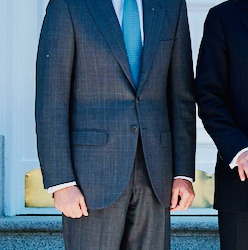
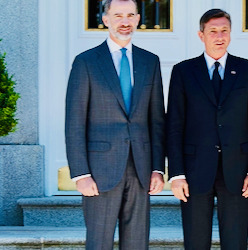
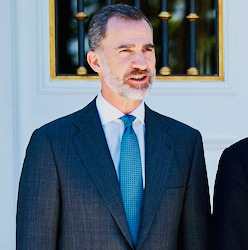
Through the Years → Felipe VI of Spain (2,069/∞)
27 June 2017 | King Felipe of Spain receives Slovenian President Borut Pahor at the Zarzuela Palace in Madrid, Spain. (Photo by Carlos Alvarez/Getty Images)
2 notes
·
View notes
Text
Intervjuji: Kaj je Golobova piarovka Vesna Vuković zamerila Nataši Pirc Musar in še komu
Intervjuji: Kaj je Golobova piarovka Vesna Vuković zamerila Nataši Pirc Musar in še komu
Siol.net danes zadnji dan vodi odgovorni urednik Peter Jančič, ki se bo po drugem krogu predsedniških volitev čez dva tedna ponovno zaposlil na Spletnem časopisu. Od takrat bo Spletni časopis tudi spet polno deloval. Po poslovilnem intervjuju s predsednikom republike Borutom Pahorjem, ki je bil objavljen v nedeljo, Siol.net danes objavlja še intervjuja s predsedniškima kandidatoma, ki sta se…
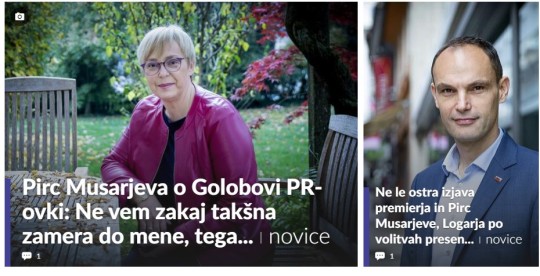
View On WordPress
0 notes
Text
Pahor: Na Balkanu nema promjena granica bez rata
Pahor: Na Balkanu nema promjena granica bez rata
Predsjednik Slovenije Borut Pahor izjavio je da podržava sve inicijative koje doprinose miru i stabilnosti u regionu, istakavši da “Otvoreni Balkan” ima potencijal da podigne ekonomsku saradnju na potpuno novi nivo, gdje bi svi imali koristi i da bi doprinio da se svaka zemlja “pojedinačno bolje pripremi za Evropsku uniju”
“Međutim, i želim da budem vrlo jasan u vezi sa tim, inicijativa Otvoreni…

View On WordPress
0 notes
Text
Procedural story generation, AI, adaptive environment and a system of generating personalized player's game reality in The Sims 2 and why a completely different game is mentioned here
Weird West is a game that follows the "immersive sim" gameplay philosophy, with an overhead view from Arkane Studios founder Raphaël Colantonio.
Here is a video in which Raphaël Colantonio talks about the difficulty and risk of developing "immersive sims":
Weird West Developer Opens Up about the Complexity & Risk of Designing Immersive Sims
youtube
On March 29, 2022, the game's lead engineer, Borut Pfeifer, shared on Twitter an episode from the developers' diaries that was about how players' actions affect the people and places around them and commented that:
"This one features a little sneak peak of some of the procedural story and AI..."
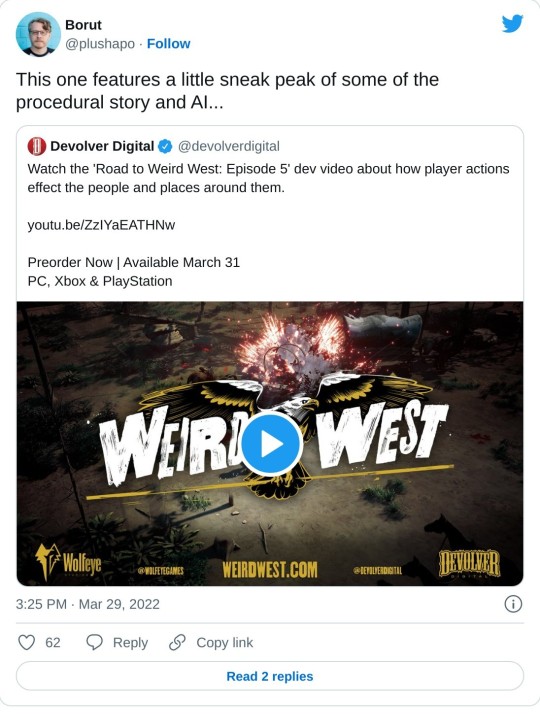
Here's the episode: "Weird West | Road to Weird West: Episode 5"
youtube
Jake Simpson, lead modeling and tools engineer for Sims 2, commented on this tweet as follows:
Wow, this is almost exactly what I pitched EA about eighteen years ago, using The Sims 2 codebase.
Well, good ideas occur to more than one person.
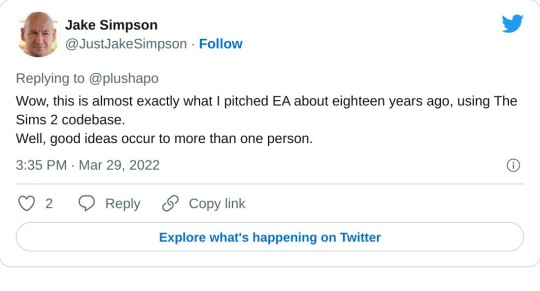
One of the goals during the development of The Sims 2 was to make the environment adaptive based on player decisions. Mike Sellers, the game's game designer, talked about this. Here's what he wrote about it, answering a question about the goals that they wanted to implement in the game:
Make the environment adaptive based on the player's decisions. This is probably my favorite thing that didn't make it in: we wanted to vary the lighting, camera angles used, and music based on the kinds of objects the players purchased -- so if you bought a bunch of creepy things vs. hearts and flowers, we'd use lighting/sound/view angles corresponding more to a horror movie vs. a romance. Among other things we were able to show that the same animation of two Sims kissing looked and felt very different when set to romantic violin music vs. smoky sexy jazz music (one exec who watched the two sequences said the jazz one had a lot better resolution -- but it was literally the same video of an animation in both cases).
In the context of procedurally generated story, AI and the reaction of the game to the player's actions, it is necessary to talk about the system of generating personalized player's game reality in The Sims 2, which was described by Vadim Sims, one of the researchers of the history of game development on The Sims Creative Club forum.
How does the system behave?
The most obvious manifestation of the system are the tutorial messages that appear during the game.
I quote Vadim from the topic "Life stories of your families, scenarios, plots":
What did I write in my time? That the game, which is not really a game at all, but a graphical superstructure over the artificial intelligence, "reads" the player's personality by his first actions and begins to form an PERSONALIZED game reality for him, right? But as soon as the game is able to "read" the player's psychotype, what prevents it from trying to predict the development of the story, which the player would wish?
The fact that the game tracks the player's actions doesn't even need proof. An example - "tips". The fact that we first turn them off, saves us only from the pop-up with tips. The tracking of the player's actions does NOT stop, and it is disabled only when free will is turned off, and in this case, it is not certain that it will be fully disabled.
Sims themselves can change their behavior depending on the actions of the player. And even their aspiration is not an obstacle to change. Vadim Sims from "Don Lothario" thread:
First of all it is necessary once and for all to put an end to the myth that everything that happens in the game is random, because the game "mechanics" is MUCH more complicated than we imagine it and can imagine in principle. The fact is that we are dealing with a real artificial intelligence, hastily disguised as "Dollhouse and Dice", which, for example, knows such concepts as "empathy" and which " read" on the first actions of the player his "personality" begins to form for him an PERSONALIZED game reality, and this, including, applies to (attention!) and the "story" part of the game too. For example, someone doesn't like such "heartbreakers" as Don seems to be at first sight, so he or she will have a " lewd and horny Don who won't rest until he dies," and the scripts will work accordingly. And for me, who knows the true history of its historical prototype, and, of course, a little bit of the history of its creation, and, in connection with all this relating to Don, despite all his faults, with sympathy and Don will be "different" and the scripts associated with it will work differently. Exactly for these reasons, even when playing on the same "collection" that I play, no one can reproduce one-to-one what happens in my game, and I, accordingly, cannot reproduce what happens to a person who plays "with soul" (the game of such a player knows how to "determine"), and not "just plays to kill time". By the way, the game is able to "read" the mood of the player and "adapt" to his mood. If a player has a heavy heart, the game will be "gloomy and gothic" (c) for him. He's having fun - there's going to be a lot of hilarious thrashing going on in the game. And if the player is in love during the game, but is not even aware of it, the game manages to " read" it - and "gives" him such a Love Story that everything becomes clear without words...
Sounds fantastic, doesn't it? And yet this is exactly how the game works, believe us, who had their own eyes widened when we finally realized that in the case of the The Sims 2, we are dealing not even with "what" but with WHOM.
Also, the operation of the system may be different in The Sims 2 from, for example, The Sims Life Stories:
This post from Diana-sima, @diana-sim-sima , member of forum:
If I play a The Sims 2, then I have all-most of the characters frivolous ) It doesn't even depend on aspiration ) In the The Sims Stories, no matter The Sims Pets Stories or The Sims Life Stories, many characters are prudes and show feelings only if there is any relationship above friendship (e.g., sympathy). As it is, most of them are bitchy and mean :)
If unlock the ability to sims themselves to look for work, then they will look for themselves and change it:
This post from Vadim Sims:
Shortly before the "war" between the fans of The Sims in 2009, a group of guys from among those who are interested in the game, but not in their role in the "near-game" crowd, deeply involved in what we, by trial and error, only now are trying to do, namely - porting objects from the later expansion packs to the earlier. Let me say at once that they achieved a lot of success in this task, but then the "war" and the 10th "stagnation" that followed it began.
Among other things they ported was a "reward" computer from The Sims Life Stories. The "strangeness" of this computer - that any change in it, such as allowing children and teenagers to write novels, begins to act "globally", affecting all computers - we will not now consider, for much more interesting was another...
As I have already written (and more than once) that I am a novice and inexperienced simmer, for I have been seriously engaged in the game in recent years. So the way I once managed to get the Sims to start looking for jobs AUTOMATICALLY was pure chance. And that's where the most interesting part began...
The fact that after the activation of the "autonomous system", Kaylynn, Nina, Dina or Bella (Bella - even during a date, before moving in) who were moved to Don's house, already began to look for a job themselves - it's understandable, just as it's understandable that decisions will be made whether they were for the proposed vacancy or not, I had to, because they themselves, of course, could not click on the sign for "Next".
With Kaylynn was the easiest, because, according to the script, she was given the job she wanted in security (read: the ability to get a scanner to explore the house and the need to increase her login skills by using the "same"🛸 telescope) immediately. But with Nina and Bella it was more complicated. The thing is, the job vacancy in the slacker field appeared after midnight, and they started looking for work before. If they were employed for something more or less tolerable from THEIR point of view, everything was like with Kaylyn. If they were not employed anywhere, they dutifully waited until the next day, and then went back to the computer to look for job. But the situation was even more interesting if they were hired at the first job they could find, because the next day they came back from work... they'd go to the computer and look for a new job. But there was a nuance. If they managed to get promotions in an " unwanted" job, they sort of agreed to "tolerate"... for a while, but until the first "screw-up", after which they would not "get off the computer" until they were offered a job that was acceptable to them. By the way, if it so happened that they had three promotions in a row, they sort of "got involved" and their attempts to change jobs began not with the first, but with the second and sometimes even the third "screw-up". And, by the way, if after getting promoted in a "unwanted" job and getting a bonus, I would fire them from there myself, then for a few days, depending on the size of the bonus, they would not try to look for a new job, even if they had a desire to find a job.
Don, by the way, was also trying to "get out" of his job, but it was Dina who was the most brainwashed in this respect. When she started looking for a job on her own, she seemed to want to get a job as a politician, for example, in addition to being a doctor. You do. She seems to be working. But the first screw-up happened - and she went to look for a new job. She had a desire for a promotion, and it wasn't satisfied in the foreseeable future - slammed the door again. And if you make her a doctor - no matter what happens, she does not change her job, even if she is a nurse up to her gray hair, and even with a lot of reprimands in the work history and a stack of orders to deprive her of premiums, because, apparently, this is her calling 👩🏼⚕️.
The fact that the above-described behavior of the sims is HUMAN behavior, not the behavior of pre-programmed "dummies" is obvious. It is also obvious that when faced with something that was not foreseen (or was...once upon a time 🤔), the game engine was capable of a kind of "self-learning" or of... or to make SELF-DECISIONS, which in both cases is a clear sign of having intelligence.
Dina had a desire to "Reach the pinnacle of her medical career. But not right away, and only if she had a more or less successful career, I mean, she was advancing up the career ladder.
But the desire to "Get a job in medicine" was initially "nailed down" to her, just as, say, for Kaylynn, the desire to get a job in security was nailed down to her.
By the way, Dina is a real sly one. She doesn't have a strong desire to move up the career ladder. And when it does, she often wants to have a baby along with it.
From a human point of view - both logical and vital. "Grabbing" before the maternity kicked out a promotion, " locomotive" and, accordingly, increased payments on the maternity will receive. Plus a bonus as a "safety cushion".
And sims can also cancel their own actions. In this case, its icon will be crossed out, as if the player himself canceled it.
The conditions for the best manifestation of the work of this system
I understand that you need to play as a sim as if you yourself were in his place and interact with other sims as if they were real people - that is, immerse yourself in the role. Play with "soul", don't be a "puppeteer" for sims.
Where to start to explore this system?
I think the research can start from how data about a player's playing habits are stored within the lot. Here is my post in which I described this idea in Russian language:
This is the English translation of this post:
If anyone is interested in figuring out how the game generates "personalized game reality," there's an idea of where to start "digging".
Jake Simpson, a lead simulation and tools engineer for Sims 2, wrote in The Sims 2 Dev Twitter Thread Part 1 that collecting and analyzing player play habits was still in Sims 1 and gave the example of uploading a lot to the site, and that the lots stored data on player play habits:
One thing that not many people know is that The Sims 1 was doing game analytics way before Analytics was A Thing. When you upload a lot to the web site, to share with others, you are actually uploading a bunch more data than you think.

Inside the house upload is also a bunch of information about your playing habits in The Sims. None of this information is identifiable to individual players - EA was way ahead of the curve in terms of player privacy - it was just data that indicated how people were playing.
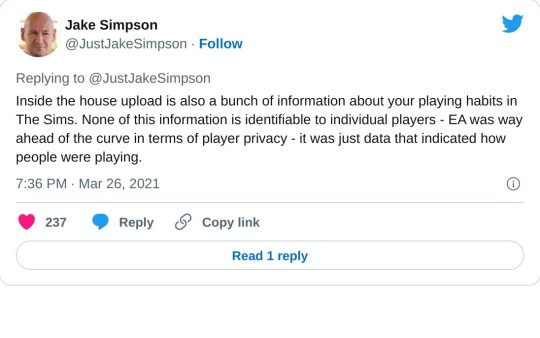
Will (Will Wright) was fascinated by this data. Real live big game playing data. He used to write lots of database queries to work out player trends and so on. This is actually where Spore came from; the idea that something you do, on your machine, can affect how others are playing their game.

The idea that you playing your single player game could affect someone else playing their single player game, by changing their environment in response to what you did in yours was like catnip to Will.

In The Sims 2 an option to upload the lot to the site available too:


"Package Lot to TheSims2.com"
And it most likely works identically in The Sims 2, since The Sims 2 is based on The Sims 1. From Jake Simpson's The Sims 2 Dev Twitter Thread, you can understand that:
So, where to start telling stories?
Sims2 was built on top of Sims1, unlike Sims3, which was a complete re-write from scratch (undoubtedly the right decision, since we inherited a bunch of tech debt from Sims1, and Sims3 could never have done what they did sitting on our code.)

As a result, we inherited the Sims1 tools for building worlds and those had to be rebuilt completely, since the plans for Sims2 were so much bigger than Sims1. Will Wrights tagline for Sims2 was "A more bitchin' human simulator'.

So, from the research of how the data about the player's playing habits are stored inside the lot you can start, gradually then diving into the depths of the code and SIMPE.
Vadim Sims was not the only one who noticed this system working. Here is a message from another player who noticed that the game is trying to hint to the player to implement his idea in the story of the lives of the sims whom he plays:
Post in the forum thread 'Life stories of your families, scenarios, plots':
I don't know in which thread to share this. This is not a story or even a sketch. Just want to tell you a little bit about my favorite and only family in Sims 2, thanks to which I rediscovered the game. It just so happens that I can't play it anymore, and I think after this post I should put a fat end to it and maybe start over from scratch) A total of 24 generations I have played, explored everything possible, unlocked all the career rewards, built a huge house (more precisely, the family mansion)) ), and the sims themselves in each generation of scientists - skills pumped to the maximum + all the books are studied. Sometimes I even envy people who get tired of playing as a family somewhere after the second generation - at least you don't get very attached.)) And for me, each new generation is already a completely different family, with its own characteristics, stories, and aspirations. There is no point in telling about each generation, let alone about each family member. And much has already been forgotten.)
Screenshots are unavailable.
Well, in general, the game often surprised me with unexpected plot twists: once it was not in my favor, but basically I liked it, I love The Sims 2 for it) It also happened that you were going to do some trick in this very "plot", but you were afraid of the consequences, and then - the game itself hints at it! Someday, maybe I'll think of writing a story)
And according to Vadim Sims, a close research of such stories is a good way to understand how this intelligence works, the system of generating of personalized game reality of the player:
What did I write in my time? That the game, which is not really a game at all, but a graphical superstructure over the artificial intelligence, "reads" the player's personality by his first actions and begins to form an PERSONALIZED game reality for him, right? But as soon as the game is able to "read" the player's psychotype, what prevents it from trying to predict the development of the story, which the player would wish?
The fact that the game tracks the player's actions doesn't even need proof. An example - "tips". The fact that we first turn them off, saves us only from the pop-up with tips. The tracking of the player's actions does NOT stop, and it is disabled only when free will is turned off, and in this case, it is not certain that it will be fully disabled.
That is why a close research of such stories is a good way to understand how this intelligence works.
I totally agree with that.
Original (на русском языке):
#sims 2#ts2#sims2#the sims 2#ts2 simblr#simblr#the sims#weird west#Youtube#artificial intelligence#AI#the sims life stories#game development#game desing#don lothario#kaylynn langerak#nina caliente#dina caliente#bella goth#Jake Simpson#Will Wright#twitter#quora#quora answers#noclip#Raphaël Colantonio#youtube#the sims stories#sims 2 beta#the sims 2 beta
19 notes
·
View notes
Text
Et tu, Borute?
3 notes
·
View notes
Text
War and the transition to capitalism entailed the great amounts of violence that were necessary to dismantle socialist forms of management and belief, full and stable employment (private labour power market), the sell-out of the accumulated and socialised means of (re)production and infrastructure (privatisation). This process resulted in the deaths of approximately 140,000 people, the marginalisation of entire social groups and minorities, class stratification, increasing pauperisation, and intensive migration that has not stopped ever since. The post-socialist transition was structured as a "modernisation" campaign and conducted in compliance with foreign investment agencies and European Union prerogatives. However, one should not forget that the post-socialist transition was effectively organised from within, and was a consequence of the internal fractures of self-management . . .
. . . this process unfolded with a long-term counter-revolutionary transformation of the ideological apparatuses that targeted the memory of socialism and the events surrounding World War II. This is a process that I call the "primitive accumulation of memory" by the state. As previously pointed out, some right-wing historical revisionists have argued that Yugoslavia was totalitarian and, in that way, the Yugoslav people experienced a "double occupation": at first by fascism/Nazism (e.g. Germans, Italians) and then by Titoism/communism (Soviets, Yugoslavs). This situation was resolved by the final hero: the nation, which was affirmed during the ethnic wars of the 1990s. Prior to the 1990s nations were victims subjugated to the cruelty of external forces – be it communism, fascism, Tito, Stalin, Europe, big powers, neighbouring states – however, since the 1990s the nations live in freedom and independence.
In this constellation the historical memory of socialism and World War II had to undergo major changes and everything socialist Yugoslavia stood for had to be ideologically dismantled. Historical and political revisionism thus organised ideological campaigns that "reinvented traditions", which defined nations as eternal, together with the presupposed pre-modern substance and religion. The new–old double bind materialised into the following: Croat–Catholic, Serbian–Orthodox, Bosnian–Muslim, Slovenian–Catholic, and "reinvented" the specific traditions.
Gal Kirn, Partisan Ruptures: Self-Management, Market Reform, and the Spectre of Socialist Yugoslavia, trans. Borut Praper & Gal Kirn
13 notes
·
View notes